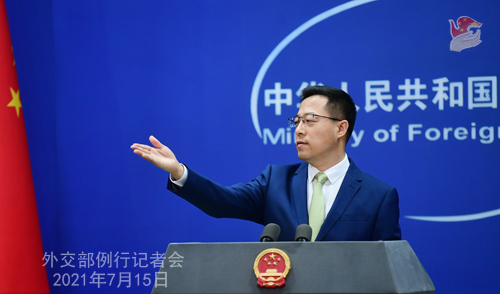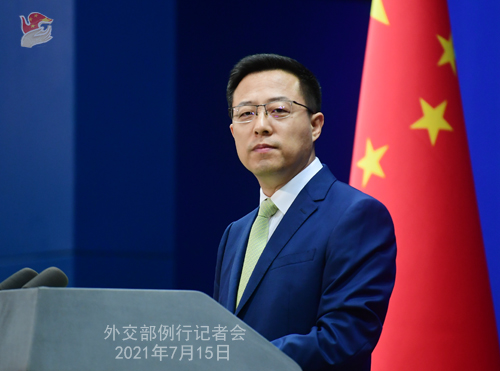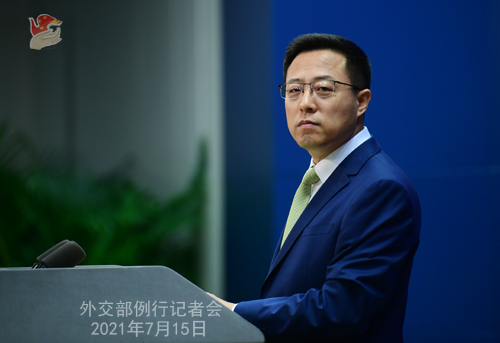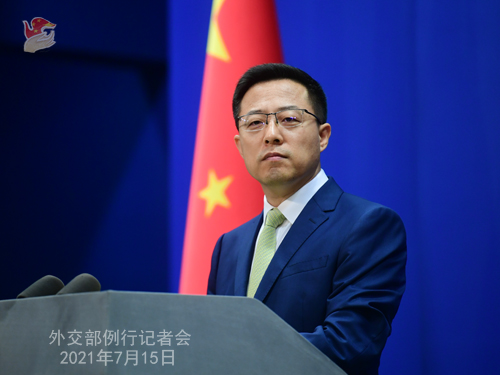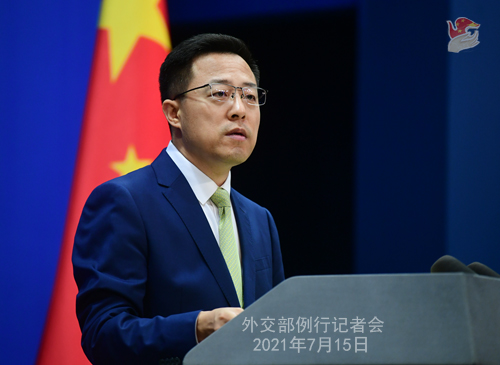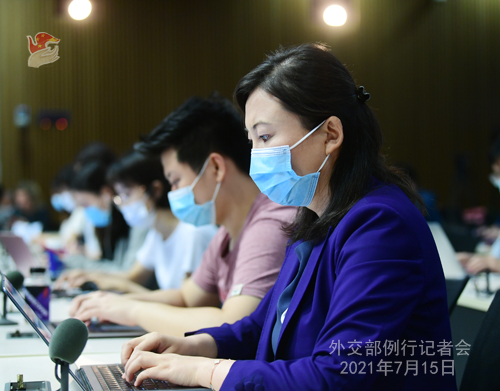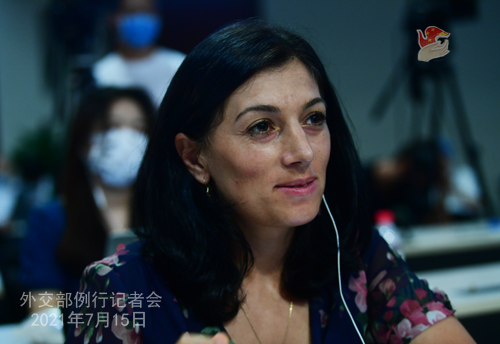| Foreign Ministry Spokesperson Zhao Lijian's Regular Press Conference on July 15, 2021 |
| 2021-07-15 19:58 |
|
CCTV: China announced the information about President Xi Jinping's attendance of the APEC Informal Leaders' Retreat. This will be the first multilateral summit to be attended by President Xi after the celebrations marking the centenary of the founding of the CPC. What's China's expectation of this meeting? Zhao Lijian: At the invitation of New Zealand Prime Minister Jacinda Ardern, President Xi Jinping will attend via videoconference the APEC Informal Leaders' Retreat on July 16. This is an important meeting held at a critical time when the world is facing a resurgence of COVID-19 and the international cooperation against the virus has entered a new stage. China sets great store by the role of APEC as an important platform for regional economic cooperation. We hope all parties can uphold the vision of an Asia-Pacific community with a shared future, carry forward the Asia-Pacific partnership, send a positive message of fighting the coronavirus with solidarity and deepening economic recovery and cooperation, so as to inject strong impetus to the fight against the epidemic and economic recovery process in the Asia-Pacific region and the world at large, and make positive contribution to promoting common development and prosperity in Asia-Pacific. China Daily: Pakistan's Ministry of Foreign Affairs said in a press release that "a bus carrying Chinese workers in Khyber Pakhunkhwa Province, plunged into a ravine after a mechanical failure resulting in leakage of gas that caused a blast. Further investigations are underway". The Pakistani side also extended "sincere condolences to the families of Chinese and Pakistani workers who lost their lives in the incident". Do you have any comment? Can you update us on the investigation and Chinese casualties? Zhao Lijian: China was astonished to learn that the incident has caused heavy Chinese casualties. The CPC and the Chinese government attaches high importance to this. Party and state leaders made important instructions right away. We must spare no effort to rescue the injured, properly attend to follow-up matters for the injured and deceased, promptly find out what happened, conduct in-depth assessment of security risks, and do our utmost to ensure the safety of Chinese personnel. The Chinese Ministry of Foreign Affairs and the Chinese Embassy in Pakistan activated the emergency response mechanism, kept in close contact with the Pakistani side in both Beijing and Islamabad, and engaged fully in dealing with the emergency. We have asked the Pakistani side to lose no time in conducting a thorough investigation, properly transfer and treat the wounded, strengthen security measures, eliminate security risks, and ensure the safety and security of Chinese personnel, institutions and projects in Pakistan. The Pakistani side has expressed sympathy and condolences in various channels and pledged to do everything possible to rescue the injured and handle follow-up matters to ensure the safety and security of Chinese personnel, institutions and projects in Pakistan. On the same night of July 14, the Chinese ambassador to Pakistan and Pakistan's foreign secretary visited the injured in hospital and conveyed the sympathy and care of leaders from both sides. Today China will send out a cross-departmental joint working group to Pakistan to help with relevant work. CCTV: On the occasion of the sixth anniversary of the Joint Comprehensive Plan of Action (JCPOA) on the Iranian nuclear issue, how does China view the prospect of the JCPOA? What is China's expectation for the negotiations on resuming compliance between the US and Iran? Zhao Lijian: July 14 marks the sixth anniversary of the JCPOA on the Iranian nuclear issue. The JCPOA, the result of 13 years of painstaking negotiations, is an important outcome of multilateral diplomacy endorsed by the UN Security Council Resolution 2231. It is a classic example of resolving disputes through dialogue and consultation, and a key pillar for upholding the international non-proliferation regime and promoting peace and stability in the Middle East. Joint efforts to safeguard and implement the JCPOA serve the common interests of the international community. China always believes that the full and effective implementation of the deal is the only effective way to resolve the Iranian nuclear issue. China welcomes the fact that the US seeks to return to the JCPOA. In the meantime, the US side needs to show sincerity by taking concrete actions to regain the trust of the international community. Negotiations on resuming the compliance of the deal have entered the final stage. All parties have shown their political will to reach an agreement, but there are still some differences that need to be bridged. The US should make an early decision to comprehensively and completely lift its illegal unilateral sanctions against Iran and third parties, while Iran should fully resume its compliance on this basis. As an important party to the JCPOA, China is firmly committed to upholding the authority and effectiveness of the JCPOA and the Security Council resolution, and taking a constructive part in the negotiations between the US and Iran to resume compliance. We will work on all parties to build consensus, bridge differences and bring the JCPOA back on the right track at an early date. No matter how the situation may change, China will always stand on the right side of history, uphold justice, advance the political settlement of the Iranian nuclear issue through diplomatic means, and safeguard the international non-proliferation regime and peace and stability in the Middle East. In the meantime, we will firmly safeguard our legitimate rights and interests.
China News Service: From July 13 to 15, voluntary national reviews were presented at the High-level Political Forum on Sustainable Development at the United Nations Economic and Social Council. What message did China send in its review? Zhao Lijian: On July 14, State Councilor and Foreign Minister Wang Yi delivered remarks at the second voluntary national review (VNR) on implementation of the 2030 Agenda for Sustainable Development. He elaborated on China's new development philosophy featuring innovative, coordinated, green, and open development for all and achievements China made in five areas in fully implementing the 2030 Agenda for Sustainable Development. First, we always take development as our first priority. China has become the only country that has moved from the low human development category to the high human development category. China is the only major economy registering positive growth during the pandemic, making significant contribution to global economic recovery. Second, we adopt a people-centered philosophy. We eliminated absolute poverty in China for the first time in history, launched an effective response to COVID-19, put in place the world's largest social security network and compulsory education system. People's sense of happiness, fulfillment and security keeps increasing. Third, we always put into practice our belief in the harmony between man and nature. We have actively implemented the Paris Agreement, improved the industrial structure and energy mix, and embarked on a path of green, low-carbon and circular development. Fourth, we embrace the trend of openness and win-win cooperation of our times. China has made the biggest contribution to global growth for 15 consecutive years. The Belt and Road Initiative, the China-Europe Railway Express, the green Silk Road and digital Silk Road inject powerful impetus into the implementation of the 2030 Agenda. Fifth, we pursue common development with all countries. China has always forged ahead with other developing countries in the spirit of solidarity. We are committed to deepening South-South cooperation. In the face of COVID-19, China has carried out the largest global humanitarian operation since the founding of New China. We honor our pledge to make Chinese vaccines a global public good and has made an important contribution to global vaccination. Hubei Media Group: State Councilor and Foreign Minister Wang Yi attended the meeting of the Council of Ministers of Foreign Affairs of the Shanghai Cooperation Organization (SCO) and the SCO-Afghanistan Contact Group foreign ministers' meeting in Dushanbe yesterday. Could you offer us more information on the two events? Zhao Lijian: At the meeting of the Council of Ministers of Foreign Affairs of the SCO, State Councilor and Foreign Minister Wang Yi said that China stands ready to build on the momentum of the SCO's 20th anniversary to join hands with other member states and build a closer SCO community with a shared future. He put forward five proposals. First, strengthen solidarity and cooperation to consolidate the political foundation and lead by example in the international community's exploration for a new type of international relations. Second, share weal and woe to ensure lasting peace and security in the region, deepen security cooperation, and coordinate positions and actions on major issues. Third, stand together to combat the pandemic, reject vaccine nationalism, oppose political manipulation on study of origins, and safeguard solidarity and cooperation in this global fight. Fourth, promote openness and connectivity, dovetail development strategies to unleash the potential of BRI cooperation and support a sound economic recovery. Fifth, step forward and jointly reject it when certain countries put unilateralism above basic norms governing international relations, and strive to build a community with a shared future for mankind. At the SCO-Afghanistan Contact Group foreign ministers' meeting, State Councilor and Foreign Minister Wang Yi said that the SCO should endeavor to ensure that the situation in Afghanistan moves in a direction that serves the shared interest of the country and other regional countries. He also suggested efforts to make sure the US fulfills its responsibilities, prevent a resurgence of terrorist forces, advance the reconciliation process, enhance multilateral coordination and facilitate peace and reconstruction in Afghanistan. China will continue to play a constructive role in promoting a political settlement to the Afghan issue on the basis of fully respecting Afghanistan's sovereignty and following the "Afghan-owned and Afghan-led" principle. Other foreign ministers at the meeting all agreed to take SCO's 20th anniversary as a new starting point to carry forward the Shanghai Spirit, deepen cooperation in various sectors, support peace and reconciliation in Afghanistan, and play a greater role in maintaining world peace and realizing common development.
Xinhua News Agency: State Councilor and Foreign Minister Wang Yi paid an official visit to Tajikistan on July 13 local time. Do you have more on that? Zhao Lijian: During his official visit to Tajikistan on July 13 local time, State Councilor and Foreign Minister Wang Yi met with Tajik President Emomali Rahmon and held talks with Foreign Minister Sirojiddin Muhriddin, with whom he also attended a signing ceremony for bilateral cooperation documents and jointly met the press. State Councilor Wang Yi said that China and Tajikistan are friendly and close neighbors and comprehensive strategic partners. With the guidance of the two heads of state, bilateral relations are at their best level historically. China appreciates the tremendous amount of work Tajikistan has done to promote the organization's development during its rotating presidency. Next year will mark the 30th anniversary of the establishment of China-Tajikistan diplomatic relations. China stands ready to work together with Tajikistan to constantly cement political mutual trust, deepen cooperation in various sectors, foster a high-quality and profound community of development, forge an impregnable security community, and jointly safeguard security and stability in Central Asia. The Tajik leadership extended warm congratulations to the CPC's centenary and commended China's remarkable development achievement. Tajikistan stands ready to deepen all-round cooperation with China, strengthen coordination and cooperation within the SCO, the China+Central Asia (C+C5) foreign ministers' meeting mechanism, CICA and other multilateral frameworks, and jointly work for positive outcomes from the SCO Summit. Reuters: The Chinese Embassy in Pakistan confirmed casualties. And yesterday we heard that the incident was a bomb attack. However, Pakistan's Foreign Ministry said later that mechanical failure caused the gas leak and a blast. What is China's position on what actually happened? Was it an attack or an accident? Also, is China satisfied with the level of protection that Pakistan is offering Chinese citizens in the country? Zhao Lijian: We noted the press release from the Ministry of Foreign Affairs of Pakistan. The incident is still being handled and investigated. China will work in close collaboration with Pakistan to investigate the incident. China and Pakistan are all-weather strategic cooperative partners with unbreakable traditional friendship and political mutual trust. The two sides will follow the important consensus reached by our leaders, take the 70th anniversary of diplomatic relations this year as an opportunity to maintain close communication and deepen strategic mutual trust, firmly support each other's core interests and major concerns, promote the high quality development of the CPEC, jointly fight COVID-19 and elevate bilateral relations to a new height to deliver greater benefits to both peoples and inject fresh impetus into developing a new type of international relations and building a community with a shared future for mankind. The Pakistani side has said it places great emphasis on and will continue to take concrete measures to effectively protect the safety and security of Chinese personnel, institutions and projects in Pakistan. We appreciate this. The Chinese side will work together with Pakistan to strengthen security measures for bilateral cooperation projects and ensure the safety and security of all Chinese personnel, institutions and projects in Pakistan. Shenzhen TV: According to media reports, the Penelakut Tribe in British Columbia announced on July 12 local time that it had found more than 160 "undocumented and unmarked" graves in its residential area, once home to the Kuper Island Residential School. This is the fourth "undocumented and unmarked" graves found in Canada since May this year. Do you have any comment? Zhao Lijian: The news is shocking and outrageous. The graves discovered one after another have exposed systemic racism in Canada time and again. People cannot help but wonder, how many evils are left buried in Canada. We noticed that Canadian leader responded that "I recognize these findings only deepen the pain that families, survivors and all Indigenous peoples and communities are already feeling as they reaffirm truth that they have long known". Some foreign netizens commented that the findings must have reaffirmed truth that the Canadian government has long known! Many rapporteurs and human rights experts of the UN Human Rights Council have urged Canadian authorities in a joint statement to conduct thorough investigations into the discovery of mass graves containing the remains of Indigenous Peoples in boarding schools. However, in the face of solid evidence, the Canadian government has made perfunctory responses and even shifted the blame to the Catholic Church. The Canadian side has been trumpeting the readiness to seek truth but has rarely taken real actions. The lip service would only hurt the Indigenous Peoples more. The practice has also fully exposed Canada's hypocrisy on human rights issues. The Canadian side should show deep remorse and take concrete measures to thoroughly investigate the abuse and discrimination against the Indigenous Peoples, call for accountability and provide compensation, so as to earnestly address its systemic racism. RIA Novosti: It is reported that the US is looking to setting up a line allowing direct high-level communication with China. The line could allow President Joe Biden to immediately reach Chinese President Xi Jinping through encrypted phone calls or messages. Does China think such a mechanism is necessary? Zhao Lijian: As far as I know, there are multiple lines between China and the US for the communication of heads of state, and foreign affairs and defense authorities. These lines have been playing important roles throughout the years.
Beijing Daily: The 44th Session of the UNESCO World Heritage Committee will be held in Fuzhou, Fujian Province, from July 16 to 31. Can you brief us on China's work on World Heritage conservation? Zhao Lijian: The 44th Session of the World Heritage Committee is the second time China has hosted the annual event in world heritage with milestone significance. Since China acceded to the Convention Concerning the Protection of the World Cultural and Natural Heritage in 1985, it has been earnestly implementing the Convention with remarkable achievements. China now has 55 World Heritage sites and is one of the countries with the broadest categories of World Heritage sites. Among them, 14 are natural World Heritage sites and four are Mixed Cultural and Natural Heritage sites, the combined number of which ranks first in the world. China's overall conservation of World Heritage sites is significantly better than the world average. According to the authoritative assessment on conservation of World Heritage by the International Union for Conservation of Nature (IUCN), 63% of natural World Heritage sites and Mixed Cultural and Natural Heritage sites have a positive conservation outlook, while the number for China is 89%. The IUCN found 7% of the sites in the world in "critical" status, while zero in China. For more than 30 years, China has been innovating the idea of World Heritage Conservation and improving its management, contributing China's wisdom, solution and strength to World Heritage conservation. China has incorporated World Heritage conservation into national strategy, built a fairly complete system for World Heritage conservation, management and monitoring, made full use of the specialized institutions and new technologies, and provided more and better pathways and approaches for World Heritage conservation. At the same time, China has been actively participating in the global governance in the field of World Heritage, supported UNESCO in implementing the Priority Africa strategy, and provided help to countries including Cambodia, Kenya and Nepal regarding heritage protection and renovation to the best our ability. China has been conserving World Heritage, the shared asset of humanity, with a great sense of mission and responsibility. China is ready to take this session as an opportunity to have an in-depth exchange and cooperation with all countries in World Heritage conservation and make new contribution to the World Heritage cause. SCMP: A geospatial imagery firm released a report saying that Chinese ships have been dumping sewage in waters of the Nansha Islands. An official on the Philippine side said the case is under investigation. However, the photo of a ship seen dumping waste accompanying the report was found to have been taken in the Australian Great Barrier Reef in 2014, not a Chinese ship. This has called into question the authenticity of the report. Do you have any comment? Zhao Lijian: This is one of the best jokes recently. China strongly condemns the US firm who distorts facts, violates professional ethics and maliciously starts rumors to denigrate China. We are ready to work with regional countries to remove disturbances and jointly uphold peace and stability in the South China Sea. Reuters: The US Senate passed legislation on Wednesday to ban import of products from Xinjiang, citing the ongoing genocide against Uyghurs and other Muslim groups. This policy will require importers to more thoroughly vet their supply chains in China. What is the Foreign Ministry's response to this? Can the ministry give any comment on the potential business impact in China, as well as whether China will be considering any concrete retaliatory actions? Zhao Lijian: China has stated its position on Xinjiang-related issues on many occasions. The accusation of "forced labor" is a sheer lie. The true intention of the US moves to hype up this issue is to undermine Xinjiang's prosperity and stability, and deprive the people in Xinjiang of the right to subsistence, employment and development. What the US has done amounts to forced unemployment and forced impoverishment. It fully reveals the sinister intention of the US to use Xinjiang to contain China. On human rights, the US is in no position to lecture others in a sanctimonious way. In the US, there are about 500,000 child farm-workers and many work over 72 hours per week. Tens of thousands of people are trafficked into the US and sold to sweatshops. At least 500,000 people in the US have been subjected to modern slavery. The label of forced labor suits the US better than anyone else. The US should earnestly reflect on its own poor human rights record, pay more attention to its problems at home, and take concrete measures to deliver benefits to its people. It should stop wasting time and energy in smearing and attacking China by exploiting the issue of forced labor, stop moving forward with the relevant bill and stop manipulating the issue out of political agenda.
Beijing Youth Daily: An opinion piece published by the Washington Post on July 13 criticized the US of hoarding COVID-19 vaccines that leads to severe waste. The article pointed out that the greatest failure of the current US pandemic response is that it has become fixated on the disease at home while giving lip service and responding slowly to the threat abroad. The US attempts to reach the overambitious goal of vaccinating 70% of American adults with at least one dose by July 4. In the process, the government has hoarded vaccines in surplus, putting millions of vaccines on track to expire and end up in the trash. The waste is expected to continue into the fall. The United States purchased a whopping around 200 million additional Moderna doses for boosters, despite no evidence that boosters are needed for the general public. Do you have any comment? Zhao Lijian: They remind me of a line by Chinese poet Du Fu: "while meat and wine go to waste behind the vermilion gates of the rich, the poor is frozen to death on an empty stomach by the roadside." Now even the US media cannot stand their country's selfish hoarding of vaccines. UN Secretary-General Antonio Guterres said that we need at least 11 billion doses to vaccinate 70 percent of the world to reach herd immunity and end this pandemic, noting that there is uneven access to vaccines. Indeed, the international community bears witness to such selfish practice of the US, which severely deprives developing countries of equal access to vaccines. This is not what a responsible country would do. How disgraceful! The pandemic is spreading in many parts of the world with greater challenges posed by variants of the virus. In this context, the US practice of hoarding and wasting valuable vaccines is no different from strangling developing countries' vulnerable anti-epidemic lifeline. Every dose of the vaccines hoarded and wasted by the US could have been used to save someone's life. When the US throws surplus vaccines in the trashcan, we should not only think about the numbers of vaccines wasted, but also be mindful that the US is walking away from conscience and international responsibility. China always believes that COVID-19 vaccines should be made a global public good and we need to ensure their accessibility and affordability in developing countries. We stand ready to continue to do our utmost to provide vaccines to other countries and work with all parties to build a global community of health for all and make greater contributions to the global fight against the pandemic. Bloomberg: The Bloomberg has reported that the US Treasury has no plans to restart the regular China-US Strategic and Economic Dialogue. This dialogue started from 2006, and was halted in 2018 by the Trump administration. Does the foreign ministry have any comment? Zhao Lijian: The US side is overthinking this. Global Times: On July 12, Tokyo Electric Power Company (TEPCO) reportedly said that the nuclear contaminated water from the Fukushima Daiichi nuclear power plant would be diluted with seawater before being released into the sea. However, given that it would take too long to determine the concentration of tritium in the diluted water, TEPCO plans to forsake testing, and instead proposes to determine whether the level of tritium meets the requirement based on the amount of seawater mixed with it. In this scenario, up to 500 cubic meters of nuclear contaminated water would be released per day. On July 13, Japan's Tohoku Electric Power Company announced that the company's Onagawa nuclear power plant in Miyagi Prefecture had a hydrogen sulfide leak on July 12 with seven staff members reporting symptoms of poisoning. These latest incidents have once again raised concerns about loopholes in Japan's nuclear power management. What is China's comment? Zhao Lijian: Since Japan made the unilateral and erroneous decision to release nuclear contaminated water into the ocean in April this year, there have been a succession of leaks with nuclear waste containers at the Fukushima nuclear power plant. There is now a hydrogen sulfide leak at the Onagawa nuclear power station. We wonder how many more leaks are yet to be discovered. It is particularly alarming that TEPCO plans to skip testing the level of tritium in the nuclear contaminated water in order to save money and trouble. How Japan handles the nuclear contaminated water from the Fukushima nuclear accident bears on the global marine environment and international public health. It is by no means a private matter of one country or one company. Japan should take the concern of the international community seriously, and mustn't take the liberty of starting the discharge process before reaching consensus with all stakeholders including its neighbors and relevant international institutions. The International Atomic Energy Agency (IAEA) has recently set up a technical working group on the disposal of nuclear contaminated water from the Fukushima nuclear accident in Japan, with participation of experts from China, the ROK and Russia. With the IAEA technical working group in place, Japan can forget about playing tricks to fool its own people and the rest of the world. Japan needs to stop fudging the issue and dodging its responsibility, adopt a sincere and responsible attitude, and prudently handle relevant issues in an open, transparent and scientific manner. Japan should cooperate thoroughly with the IAEA working group, and mustn't make the world pay for its wrong decision.
Reuters: India's Foreign Ministry said on Wednesday that the situation between China and India, referring to the border clashes, was not in the interests of both sides, and was hurting the countries' relationship. It followed a meeting between China and India's top diplomats in Tajikistan. I want to ask whether the Chinese side feels this meeting has changed the current situation between China and India at all and whether the Chinese side is participating in any further concrete discussion about solving the issue? Zhao Lijian: The Chinese side has released information on the two foreign ministers' meeting. You may refer to that. The Paper: The situation of COVID-19 epidemic has been worsening in Indonesia recently, with biggest daily increase in coronavirus infections globally. You said China will provide urgently needed assistance to Indonesia the other day. Could you share any information on the specific steps China has taken in this regard? Zhao Lijian: As major developing countries, China and Indonesia have been leading international anti-epidemic cooperation. Early last month, State Councilor and Foreign Minister Wang Yi and Indonesia's coordinator for cooperation with China and coordinating minister Luhut Binsar Pandjaitan held the inaugural meeting of the China-Indonesia high-level dialogue cooperation mechanism, during which the two sides reached important consensus on anti-epidemic and public health cooperation. Our hearts are with the Indonesian side who is faced with pressure in fighting epidemic. This morning, Assistant Foreign Minister Wu Jianghao and Deputy Coordinating Minister Odo R.M. Manuhutu had a Secretary-General Special Meeting under the HDCM to exchange in-depth views on anti-epidemic and public health cooperation. The Chinese government will provide Indonesia with finished product of vaccines and emergency supplies such as oxygen generators and ventilators. Chinese local governments, enterprises and non-governmental organizations such as the Red Cross Society will also provide more support to Indonesia. China will also organize expert exchange meeting to share with Indonesia its experience in vaccination, research on mutant strains and medical resource scheduling. A matchmaking meeting will be held to facilitate Indonesia's purchase of medical supplies in China. In response to Indonesia's request for the building of a regional vaccine production center, China has proposed a roadmap of cooperation and stands ready to work with Indonesia to promote COVID-19 vaccine research and development and whole-industry-chain cooperation, expand other vaccines cooperation, improve people's health and well-being, enhance the accessibility and affordability of vaccines, especially in developing countries and advance the building of a community of health for all. Indonesia spoke highly of the anti-epidemic cooperation between the two countries, saying that the large amount of vaccine provided by China has played an important role in Indonesia's response to the epidemic. Indonesia thanked China for its timely help at the critical moment of the epidemic in Indonesia and hoped to continue to receive valuable support from China. China is ready to keep in close communication with Indonesia to properly implement various cooperation arrangement and help Indonesia win the battle against the epidemic at an early date. AFP: Two questions from AFP. South China Morning Post has reported that authorities in Yunnan have put up border walls and fences to prevent illegal entry from neighboring countries including Myanmar. Can you confirm this and provide any details of China's border enforcement in Yunnan? My second question is whether you have any response to reports that a US military plane landed in Taiwan this week? Zhao Lijian: On your first question, I'm not aware of the situation. I can assure you that China and Myanmar regulate borders in accordance with law. On your second question, the Ministry of National Defense has made a response. I'd refer you to the competent authorities if you have more specific questions.
|
| |||||||||||||||
|
|||||||||||||||


